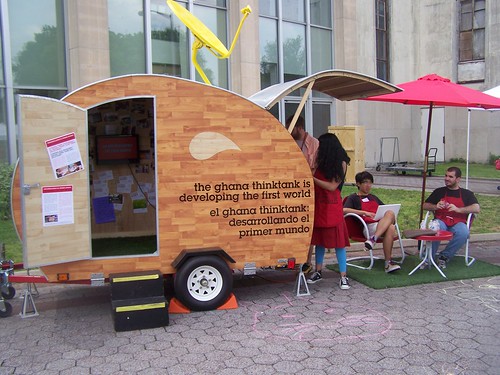Bike-based library outreach (and similar active outreach efforts by public agencies)
Notions Capital calls our attention to this NPR piece, "'Books On Bikes' Helps Seattle Librarians Pedal To The Masses," although it also turns out that Library Journal wrote about Seattle Public Library's "Books on Bikes" program in June, "Seattle Public Library Puts Books on Bikes."
Image from NPR.
Not unlike the bookmobile (and Seattle is very active with bookmobile services, which go out to schools, senior centers, and other places--Suzanne's cousin, a Seattle librarian, sometimes works the bookmobile), Books on Bikes is a mobile display, with books that people can check out, that is deployed at farmers markets, festivals, and other outdoor settings, taking the library to the people, rather than expecting the people to go to it.
From the LJ article:
Librarians on bicycles are traveling to several outdoor events across the city with a custom-built book trailer that can carry 500 pounds of materials and display 75 books at a time. The bicycling librarians will hold book talks, pop-up story times, and information sessions at venues large and small in public parks, farmers markets, and at other community events, such as the Pride Parade and PrideFest, Cyclefest, Umoja Fest, and Fiesta Patrias.
This roaming library also has a mobile Wi-Fi hotspot, which the librarians will use with tablet computers to show visitors how to access ebooks and other digital services, help answer reference and research questions, and even check out books and activate library cards for new patrons. ...
The Books on Bikes fleet has about 11 librarians and paraprofessionals who will visit different locations throughout the summer. There will be two librarians at each event to provide the variety of services. “The only thing we can’t do is we can’t pay fines, and we’re not going to return your books,” Mills said. “Everything else we can do, then and there.”
The pilot program is funded by SPL with about $1,000 for the book trailer, $3,500 for the mobile book collection and $200 for the trailer sign, Mills said. The library staff participating in the program is being paid through the library’s regular outreach budget.
The pilot will end in the fall and an evaluation will be done in October. A variety of metrics and statistics will be measured to determine the program’s success, Mills said, such as the number of items circulated, new users signed up, the number of book suggestions handed out, and the number of reference questions answered, as well as other hard numbers and anecdotes. Mills will submit an evaluation report to the library leadership, who will decide if the Books on Bikes program should be continued.
I think it's cool not just because it's a novel way to utilize bikes as a way to deliver public services (like police on bikes, or paramedics on bikes, etc.), but because it's a novel way to engage in outreach by a government agency, and it supports and extends civic engagement.
Grist Magazine has an article on the subject too, "Tiny bike-based libraries pedal books to streets and parks," and points out that the "tiny library on bikes" movement started in a more guerrilla fashion, and has only been recently picked up by libraries--Tucson before Seattle, and Denver more recently.
They don't mention, but I think it's also really cool, the outdoor Reading Room at Bryant Park in Manhattan, although these days they seem to be stinting on items for the newspaper rack.
They have racks for magazines, newspapers, childrens books, fiction, and nonfiction, author readings, story time for children, and other events.
Getting back to the bike-based library idea, using this concept, I'd like to see a special "urban issues" mobile library, and also you could do city general, thematic, and neighborhood history displays.
What better way to promote urbanism?
 Definitely planning offices and historic preservation offices could use this technique. See the past blog entry "Engaged civic/planning efforts."
Definitely planning offices and historic preservation offices could use this technique. See the past blog entry "Engaged civic/planning efforts."A not dissimilar technique, in terms of engagement, was done by the Ghana Think Tank project, which I came across a couple years ago, outside the Queens Museum of Art.
A trailer is tough though because it's small and can't hold very many people at one time.
And this mis-titled entry, "Community cleanups (and other activities) as community building and civic engagement activities," mentions a mobile display on urban sustainability by the Montreal Eco-museum project. We saw it at the Frontenac Farmers Market (we went there because I wanted to see the display on the proposed light rail system, which was up at the public library).

Labels: civic engagement, community building, community organizing, libraries, participatory democracy and empowered participation, urban design/placemaking, urban revitalization





2 Comments:
Thanks so much for the site, I found a lot of useful information for us.
Buy <a href="https://dozepharmacy.com/product/banocide-forte-100mg-tablet-diethylcarbamazine/“>Diethylcarbamazine</a> Online, which is Anthelmintics & Anti-Worm medication, and it contains Diethylcarbamazine. Banocide Forte 100 mg can treat parasitic infestations that is caused by worms. Diethylcarbamazine Tablets are antiparasitic drugs.
Post a Comment
<< Home